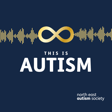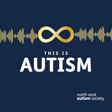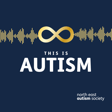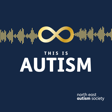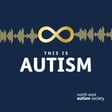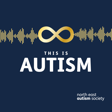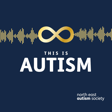Become a Creator today!Start creating today - Share your story with the world!
Start for free
00:00:00
00:00:01

6. Autism Acceptance Special
Join us for our Autism Acceptance special featuring two of our Autism Activists, Ed and Lucie and NEAS Family Development Manager, Kerrie Highcock.
Ed, 18, and Lucie, 15, talk about Autism Acceptance and what it means to them.
Music: Aukestra
Transcript
Introduction to World Autism Acceptance Week
00:00:08
Speaker
If there's true autism acceptance, you won't notice it because to accept something is to not see it as different to anything else. Hello and welcome to a special episode of This is Autism, the podcast from the Northeast Autism Society. My name is Kerry Heinkock and I'm the Family Development Manager at the charity.
00:00:33
Speaker
It's World Autism Acceptance Week this week where we all get together to create more understanding of what it means to be autistic and how it feels to live in a world set up for neurotypicals. I'm delighted to have Ed and Lucy with me to talk about this. Ed's 18 and Lucy is 15 and they're both part of our Autism Activist Group which is where young autistic people get together to share experiences and promote a positive autistic identity.
00:00:58
Speaker
We're going to be talking about what acceptance means and why it's important and how it looks in people's everyday lives.
Meet Ed and Lucy: Autism Activists
00:01:05
Speaker
Hi Ed, can you tell us a little bit about yourself? Hi, I'm an autistic young person. And how old are you Ed? 17. No, 18.
00:01:20
Speaker
Brilliant. And Lucy, could you tell us a little bit about yourself, please? I'm 15, recently. Yeah, I like doing various things. Great. So obviously, you're both part of our activist program. Can you tell us what you enjoy about the activist program? I think it's a nice way to express yourself, really. I think about things a lot, but then don't really have any way to put those thoughts. So it's nice to know. Just nice to see them, see that you're not the only one, that sort of thing.
What is Autism Acceptance?
00:01:49
Speaker
Okay, so we're going to talk a little bit about autism acceptance because it is going to be autism acceptance week. So Lucy, what does autism acceptance mean to you? So I think a good starting point for people really is just kind of accepting that
00:02:08
Speaker
autism exists and that it's just a neutral thing that it's, it exists, you know. I feel like a lot of, um, neurotypical people or allistic people kind of want to skirt around the fact of disability a little bit. Like if they're talking to you, especially if they're talking to a disabled person, maybe they're afraid of being offensive to them or afraid of
00:02:32
Speaker
or you know kind of comes from a place of I don't think it comes from a bad place or not intentionally being harmful but they might think inherently oh disability is a bad thing it's a thing you must be ashamed of we're not going to draw attention to it you know. I was saying to Ed before this meeting that I was watching Pointless
00:02:50
Speaker
on TV and they had a man on who was in a wheelchair and it was this really cool wheelchair like really high tech looking wheelchair and the presenter he not only pointed it out he actually complimented it and he asked how that's really cool how does that work and the guy was really chapped he sort of explained he said he built it himself he talked about the specs of it and I think this is a really good place to start with acceptance because not only was the able presenter able to acknowledge the disability from a place of
00:03:20
Speaker
you know, not thinking of it as a thing that's shameful or negative. He was able to admire it in a way as something special that made that man who he was, you know.
Awareness vs Acceptance
00:03:30
Speaker
Absolutely, Lucy. I love that example you've used, that's great. Edward, Ed, what does autism acceptance mean to you or is it something similar to what Lucy said?
00:03:41
Speaker
quite similar. Essentially, we need to accept that autism is a thing out there like any other thing. You don't need to dance around it. Nobody needs to be treated any differently than anybody else. In the end of the day, we're all people no matter what's in our heads. Absolutely. Ed, do you think there is a difference between autism awareness and autism acceptance? Well, yeah, you can be aware of something without accepting it, but you can't accept something without being aware of it.
00:04:10
Speaker
because if you are aware of something, that doesn't mean you accept it. But those who are accepting it obviously are aware of it and to accept it is essentially not to treat them any differently to a normal person, unless of course they ask you to. Yeah, absolutely. Lucy, do you think there's a difference between awareness and acceptance?
00:04:40
Speaker
I think there is a difference. I think, first of all, it's just kind of the wording of it. It's kind of associated with maybe specific causes that aren't very popular among autistic people. So it's just kind of got the negative connotation to it. But also, I think it's just not really a very effective example.
00:04:56
Speaker
It's like maybe for cancer awareness that makes sense because you're becoming aware of something that's a negative problem. You're becoming aware of it so you can fix it. But with autism, it's not just being aware of it. It's accepting it. Most people are aware of autism, but they don't understand it well enough to be able to accept it.
Why Acceptance Matters
00:05:12
Speaker
I think it's a starting point, but it's not really effective enough for campaign messages. Yeah. And as autistic young people, Lucy, why is acceptance important for you?
00:05:27
Speaker
So fundamentally, you know, autistic people aren't human. So I think it's a pretty bare minimum to try and do all you can to make sure that they feel comfortable and able to express themselves in a safe way. But also in a practical sense, autistic people can bring a lot of sort of something new to the table when you're discussing different projects or adding to society. Basically, they have a lot of unique input. You know, I think some of the great geniuses have long been speculated to be autistic.
00:05:55
Speaker
So it's just a difference in thinking can lead to new ideas I guess. Absolutely yeah. Ed have you got any examples of what autism acceptance might look like in everyday life? Well you see the thing is if there's true autism acceptance you won't notice it because
00:06:17
Speaker
to accept something is to not see it as different to anything else. You'll walk past an autistic person and be like, oh, look, there's a person. You won't think, oh, look, there's an autistic person. Yeah, absolutely. No, I like that, Ed. What about yourself, Lucy? So I think, firstly, I wasn't sure whether to put this under one question or the other, but maybe just less kind of off the bat judgment from people.
00:06:45
Speaker
Um, because a lot of the time, like maybe you want to use a disabled toilet because it's hard for you and you know, this isn't something that just applies to disabled people. There's, you know, people that have maybe like pots or a physical disability, um, or maybe a wider range of mental illnesses, invisible disabilities.
00:07:04
Speaker
There's a lot of judgment from people when you try and access accessibility because they assume that you're not disabled because there isn't kind of that education in place that teaches people about different disabilities. And, you know, I've been my family's been kind of not harassed, but, you know, had like back kind of comments about using disabled toilets and things. So I think that's one thing.
00:07:25
Speaker
maybe also just kind of small things like as a kind of backhandedness or like microaggressions or anything like that like ableist language is very common in everyday life you know just general stigma I guess and the access to accessibility is very difficult
00:07:45
Speaker
Lucy, when you mentioned ableist language there, just because some of the people listening might not know what that means, could you give us an example of some of the ableist language that you've heard before? Yeah, so not all of it applies to autistic people. Words like dumb and words like, there's another example, like idiot. Obviously the R word is more widely considered a slur now, but all of these words, I mean, there is some truth that there's ableism in insulting someone's intelligence at all because
00:08:14
Speaker
know maybe disabled people have a lower intelligence and that's not a bad thing but people will use that as an insult but yeah words like that a lot of people they're not trying like I said they're not trying to be harmful they're not really knowing that they're using that but it's I guess down to education saying this is where these words come from and this is why it's not okay to be using them as insults. Absolutely yeah yeah
00:08:35
Speaker
Ed, what do you wish the world knew about being autistic? You know, if you could give a message to educate people in the world about autism, what would it include? We're not bad people. We're not stupid or anything like that. We're just people. You don't need to add adjectives to it. What about yourself, Lucy?
00:09:06
Speaker
Again, like fundamentally, everyone needs different things. And, you know, I don't think it's a bad thing to acknowledge differences and build off of what different people need based on who they are and what they need to cope. And also, there's a lot of emphasis in society, I think, on being successful and then a lot of people's worth about what makes a person more worthy is how well they work. I mean, it's kind of, you know, in a society
00:09:36
Speaker
It makes sense that who makes the most money or who can have the most successful life or successful relationships or whatever, that's considered having a more worthwhile or fulfilled life. And I think maybe that's, again, it applies to all disabled people, but that's probably one that I would like to see change is the idea of what a valuable life looks like.
Challenges Faced by Autistic Individuals
00:09:58
Speaker
Yeah, absolutely. I would agree. Which kind of leads into the next question around the challenges of being autistic in a neurotypical world. I mean, well, a world that is designed for people that are not autistic. What do you think are the main challenges, Lucy, for you and other autistic people?
00:10:17
Speaker
Yeah, this is the one where I wasn't sure what the whole judgmental thing into it, because I think that's something that applies as well. Like me specifically, again, the thing of using disabled toilets, but trying to access accessibility, people might not understand that you are disabled. You don't, you know, quote unquote, look disabled.
00:10:34
Speaker
Um, but also, um, what I said about needing different things to cope, I think like maybe I'm 15 and I still like buy myself toys and things. Cause I find them really comforting. I think a lot of people would be quick to judge like, why are you so childish? Why are you like this? Why do you, there's not just one way to be or one way to be happy, I guess. Um, I think that's quite difficult. I mean, obviously there's ostracism from people kind of ostracization. I don't know what the term for that would be. Um, but.
00:11:04
Speaker
uh, being excluded from things. Um, and internalized ableism is a problem too. Like, so I've got a, a story I've linked to this, but I'm not sure if it's going to be too long. No, it's yeah. Show your story. Lucy, that's fine. So this is kind of about internalized ableism, but also coming to terms with being disabled a little bit, not in the way that like people talk about like grief, finding out your,
00:11:30
Speaker
a relative is autistic, and I think that's not really a helpful thing. But for me, I went to a theme park. I can probably just say the name if I'm allowed to say I went to Alton Towers. And they have this Pacific roller coaster called the Smiler. And it's really cool. It's like got 14 loops or something. It's an awesome roller coaster. But when I went there, it's very loud. It's got kind of this
00:11:53
Speaker
really just chord a laughing soundtrack to it and it's got the strobe lighting going on and it's all designed to be overwhelming and you know it's based on like a horror it's kind of a horror theme right and I went on it and it was really really distressing and I did not have a good time um but then I kind of
00:12:11
Speaker
felt bad for that. Like, why am I struggling with this? Everyone else is okay with this. Why am I not able to go on that? And so in the months after thinking about going back, I was kind of trying to like build myself out to be able to go on it and for it to be okay. But there's been that kind of sense of coming to chance with maybe something this isn't built for me, maybe I'm, it's okay to not be able to do things. I wanted to be able to help like the nerves to be able to do it. But, you know,
00:12:37
Speaker
It's okay sometimes to say, I can't handle this and that's okay because not everything has
Understanding Masking and Its Impact
00:12:43
Speaker
to be built for me. It's a bigger problem when nothing is built for you, but I don't have, I enjoyed every other ride at the park. It's not that big a deal. I don't think, but yeah, coming to terms with in a society that shames people for not being able, coming to terms with not being able.
00:12:57
Speaker
Yeah, yeah, that's really powerful actually. That's something to think about. I love the way that you phrase that actually. Yeah, that makes a lot of sense, Lucy. Ed, what about yourself? Are there any challenges that you faced as an autistic young person in a world that's predominantly designed for non-autistic people? I really struggle to talk to people, so I can't really go outside all that much because I'm
00:13:25
Speaker
really not comfortable in public places, but I challenge myself to try and do it. And I'm getting better, but even now I'm sat in my room with the blinds down and looking at a computer screen, which is how I spend most of my life.
00:13:47
Speaker
because I can't go out and find people to talk to or anything. I haven't even seen my own best friend in like three, four weeks. And I even feel uncomfortable around my friends, which makes it really hard to make new friends or keep friends.
00:14:11
Speaker
Yeah, that must be really, really difficult, Ed. And I think that leads into my next question about masking. We talk a lot about autistic masking and how many autistic people actually don't feel safe being themselves as an authentically autistic person. I mean, do you relate to that, Ed, around masking? Do you feel it's something that you perhaps do?
00:14:31
Speaker
Yeah, I'd say I'm asking right now because I'm not confident. And I'd say inside I'm crying right now because this is kind of hard. Yeah. Yeah. I'm trying. I'm making it.
00:14:49
Speaker
And you're doing an amazing job, Ed. I know it takes a lot to do something like this, so you're doing really, really well. Lucy, what about yourself? Do you relate to the idea of masking? Yeah, I mean, a lot of the time for people, I think it's subconscious. You can't really tell when you're doing it, but I think
00:15:12
Speaker
I don't know how much rather autistic people, but for me, if my mental health is worse, my self confidence is already on the low. I have, I noticed that maybe I'll change my body language on people to match them. Maybe if I'm typing to somebody, I will change my typing stuff that look like them. It's kind of when you have
00:15:29
Speaker
a really poor sense of self, that's kind of when you're most vulnerable to masking, because then you start taking on other people's sort of characteristics. And you know, it can get to such an extreme point that you don't remember who you are anymore. And you kind of try to think about yourself, you're trying to
00:15:47
Speaker
take apart what you've stolen from other people or what you've taken from other people versus what's actually genuine to you. And that's really difficult and really scary. So I think, I mean, this is not something I struggle with currently, but in the past, definitely. Yeah, it's just difficult. But I think it connects. I'm not really seeing people talk about it connecting to mental health in general, but I think it can get worse with an already kind of unstable sense of self.
00:16:15
Speaker
Yeah. Because masking is obviously becoming more and more research than I see it every day in the work that I do. But I still think that some people don't get it and they don't understand the impact of masking on young people and adults.
The Importance of Autistic Voices
00:16:32
Speaker
How do you think we couldn't change those perspectives and that understanding? Lucy, do you think we can? I think it's really difficult.
00:16:44
Speaker
definitely take a greater societal change, should be able to make it a world where people don't have to mask because I'm sure that, you know, occasionally, even neurotypical people have to do it, you know, think of a neurotypical person like a job interview or something where they've got to be big and impressive. And I don't think that's who they truly are. But for autistic people, that's not just job interviews. It's not just big events where you have to be, you know, proving yourself. It's just every day.
00:17:11
Speaker
having to kind of get by and not be thought of as weird by people because, yeah, it would take that greater societal change that weird doesn't necessarily be bad. And I think that's something that would be really hard to undo because it's so kind of in people's psyche.
00:17:25
Speaker
Yeah. And I think, you know, we often use the word safety, don't we, around masking? And I think one of you just touched on it then. And, you know, I think some young people use it to protect themselves from bullying as well. Is that something either of you have ever experienced that you feel happy to share with us? Sure. I've experienced a lot of bullying and I just recently stopped going to see the counsellor because I had depression and
00:17:54
Speaker
Thankfully, it's better now, a lot better, because in college, my whole class is autistic. I'm doing IT, so the majority of them are autistic people, because that's just a thing that a lot of them have interest in. But in high school, it was very different.
00:18:16
Speaker
And there was a phrase that kept really annoying me. People, whenever somebody did something stupid or bad or anything, they'd say, are you autistic? And that made no sense to me because why would those things have to relate? Yeah, I've heard that as well. I'd actually, you know, being used as a bit of a,
00:18:42
Speaker
an insult really for people. And that's why acceptance is so important, isn't it? So that people do feel safe and they feel like they can be their authentic self. And you mentioned that you're now in a class with mostly neurodivergent people. What's it like being around your tribe, around people that are similar to you in terms of the neurology? Is it a good thing?
00:19:08
Speaker
They typically just get along really well. Like pretty much everybody in the whole class is friends. They all go out to buy stuff and break times and all that. They'll crowd around computers playing games. They'll just talk. There's even been people who just approached me of their own free will. Normally it would take an army to force someone to talk to me.
00:19:34
Speaker
That's brilliant. I think that's one of the things I love about the activist program is getting people that are quite similar, but yet very different in the same room. I think there's some joy in finding your tribe and finding your people, which I guess links to my next question about autistic joy. What are the joys of being autistic, Lucy? What is wonderful and brilliant and beautiful about it?
00:20:03
Speaker
I think being autistic really gives you a different perspective on things. Like I said about autistic people bringing something new to the table, I think as an autistic person, I really excel at art and music because we have that heightened sense. So I really experience the world in quite, I guess, more of a visceral way then.
00:20:25
Speaker
neurotypical people might, I really like nature. I really like animals. It's kind of feeling for everything and really enjoying all of your senses to a heightened degree. So even though that can be a negative thing with sensory overload and things like that, I think it can also be an extremely positive thing if you kind of treat it with
00:20:48
Speaker
I guess more carefulness because it's easy to get overwhelmed, but also really good to be like enjoying music or enjoying art or enjoying nature using your senses in that way, I guess. Yeah, absolutely. Yourself Ed, did you want to add anything to that?
00:21:06
Speaker
I completely agree with Lucy, although the senses being heightened often seems quite bad. It has its good sides. I like music and all the things that Lucy had already said. I think the last thing I just want to finish on
00:21:28
Speaker
is, and I know the answer to this, but just for people that are listening, why should we involve autistic people? Why should we do things like this podcast? Why is it important, Lucy? Because we're really interesting and cool. Exactly. Like I just said, we do a different perspective to things. I think maybe
00:21:52
Speaker
If you have a whole room full of neurotypical people, you might get a lot of agreement. I mean, obviously, neurotypical people aren't all the same as well. They've all got different personalities and different things they're good at. But bringing in an autistic person might have a different perspective or a different idea that's so totally out of left field. And that can be maybe a bit jarring, but ultimately, I mean, even bringing in multiple autistic people, because the autistic people are all different, too. Some are really good at art, some are really good at text, some are really good at, I don't know, dance or something. You know, it's all different.
00:22:24
Speaker
skills and different thought processes, I guess. So things maybe people would have never thought of otherwise.
00:22:34
Speaker
Absolutely. And to me, it doesn't make any sense that we would try to learn about autistic experience through non-autistic people. Like, why are we not listening to autistic people about autistic experience? It kind of makes sense.
Conclusion and Contact Information
00:22:49
Speaker
Very like, clear sense to me. Ed, did you want to add anything on that one before we finish? Do you think we need to listen to autistic people more, Ed?
00:23:07
Speaker
I personally can't do the talking for them but the other autistic people can go ahead and talk and people should listen to them because most autistic people I've met are quite fun.
00:23:23
Speaker
Wonderful, and I completely agree. So I'm going to leave it there. So thank you both very much for joining us today. That has been wonderful to chat to you. Thanks for listening. If you've got any questions or comments about anything you've heard, get in touch at info at ne-as.org.uk. You can also find out more about our autism activist group on our website at www.ne-as.org.uk.
00:23:52
Speaker
The next episode of This is Autism comes out in May. In the meantime, why not subscribe to the This is Autism on Apple Podcasts, Google or Spotify. You can also follow the Northeast Autism Society on Facebook, Twitter, Instagram or LinkedIn. Bye for now!
